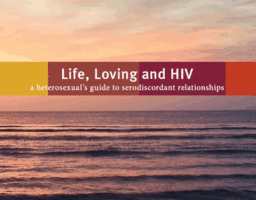Introduction
People living with HIV (PLHIV) can have relationships, have sex and have children without passing on HIV.
A positive person might feel nervous when starting a relationship with someone who doesn’t have HIV.
They might think things like:
- When should I tell them that I have HIV?
- How will they react?
- How do I explain what it means to be undetectable and the ways to prevent HIV transmission
(giving HIV to another person)?
With the right information, treatment and support, PLHIV can have healthy sex and relationships.
Telling
Telling other people your HIV status is often called disclosure. It is something to think about if you are starting a new relationship.
You will need to decide:
- If you must tell them
- If you are ready to tell them
- How to tell them
If you are not having sex with them, you may decide not to tell them.
It is a good idea to talk to a social worker or counsellor if you want to tell a partner about having HIV. They will help you prepare and support you to decide what to say, when to tell them, and what to expect.
Disclosure and the Law in NSW
If the relationship involves sex, you do not have to tell the person as long as you are taking action to not pass on HIV. Under the law this is called ‘reasonable precaution’. This can mean using condoms and/or taking your medication as prescribed, and having an undetectable viral load (see below).
Your doctor will tell you what you need to do for this
Things to Consider before Disclosing HIV Status
- Can I trust this person?
- Do they treat people with empathy and respect?
- Do they care about me?
- Am I ready for questions like ‘How did you get it?’
- Many people in the general community don’t know a lot about HIV and I may have to educate them or tell them where to find information.
Explaining HIV
Your partner may not know as much about HIV as you do. You can help them understand things like:
- What it is
- How it affects the body
- How medication stops HIV spreading in the body
- How medication stops HIV from being passed to another person
- What it means to be undetectable
You may want some help to talk with your partner about these things. Your doctor or social worker can help you and your partner learn about, and understand HIV.
PrEP (Pre-Exposure Prophylaxis)
There is a medication, called PrEP taken by the negative partner to stop HIV being transmitted.
You can talk to your doctor about taking this medication.
Happy and Healthy Together
It is normal to have some worries, even if you have an UVL and take medication as prescribed. It can be helpful to talk to a counsellor or social worker about how you are feeling. Your partner can also make an appointment to talk to someone if they need to.
Treatment is very effective if you take it as the doctor prescribes. There is support for you and your partner (see list). People who have HIV can have sex, can have partners and relationships and have children.
Love, sex and relationships are all part of a healthy and happy life.
Life, Loving and HIV
Having HIV can create challenges when negotiating sex or forming a relationship. However, everybody has the right to form intimate relationships and to enjoy a satisfying sex life; and people living with HIV are no exception.
Our booklet, ‘Life, Loving and HIV: A Heterosexual’s guide to serodiscordant relationships’ covers topics such as:
- If/when to tell your partner you have HIV
- Supporting each other in the relationship
- Having fun and staying safe


